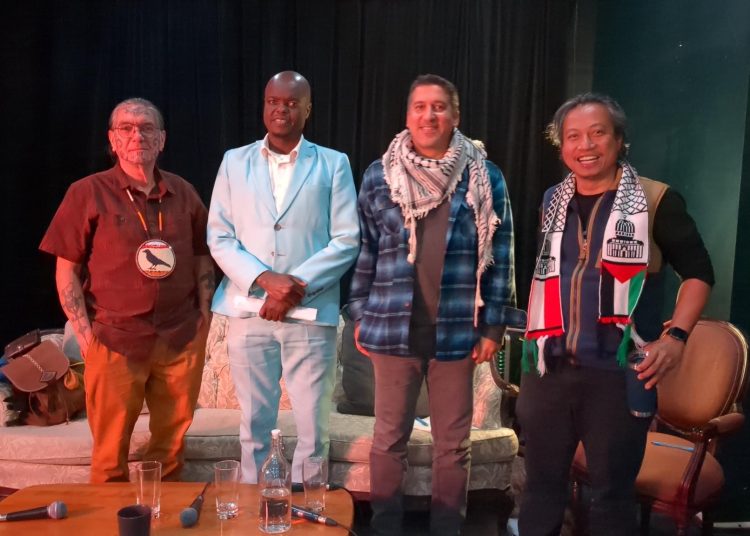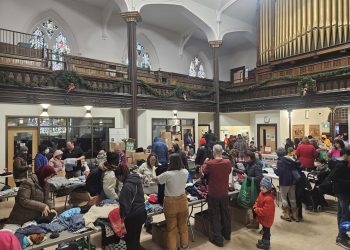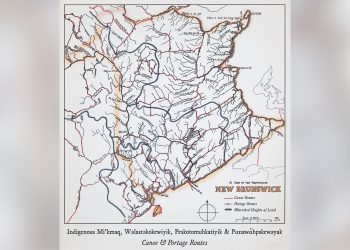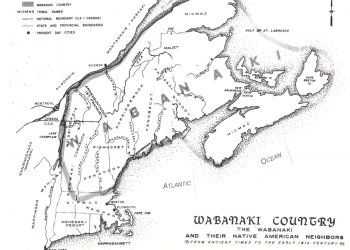Community members in Menahkwesk (Saint John) gathered at Haven Music Hall to hear genocidal and colonial histories as interlinked processes that have shaped Palestine, Sudan and Turtle Island.
Wolastoqey Grand Chief Ron Tremblay, Mohamed Adam Tebin Suliman and Helmi Alfarra shared their stories and thoughts on liberation at a panel organized by the Saint John Community Coalition on October 23.
The Grand Chief anchored his remarks in local history and memory by tracing encounters with European settlers back to the early 1600s. He spoke of treaties from the 1720s that were not surrender documents but promises the Crown would later fail to honour. He described the colonial dismantling of traditional governance – replacing consensus with imposed election systems overseen by a priest.
The Grand Chief’s testimony was both personal and political as he talked about the slow, ongoing work of reclaiming governance and culture. “Even today our people talk about colonization like the Stockholm syndrome. The church, the government, people feel like they need them, colonization is alive and well,” he said.
He criticized the Canadian state’s performative responses, the Truth and Reconciliation Commission’s 94 calls to action, he noted, have seen only the easiest items addressed.
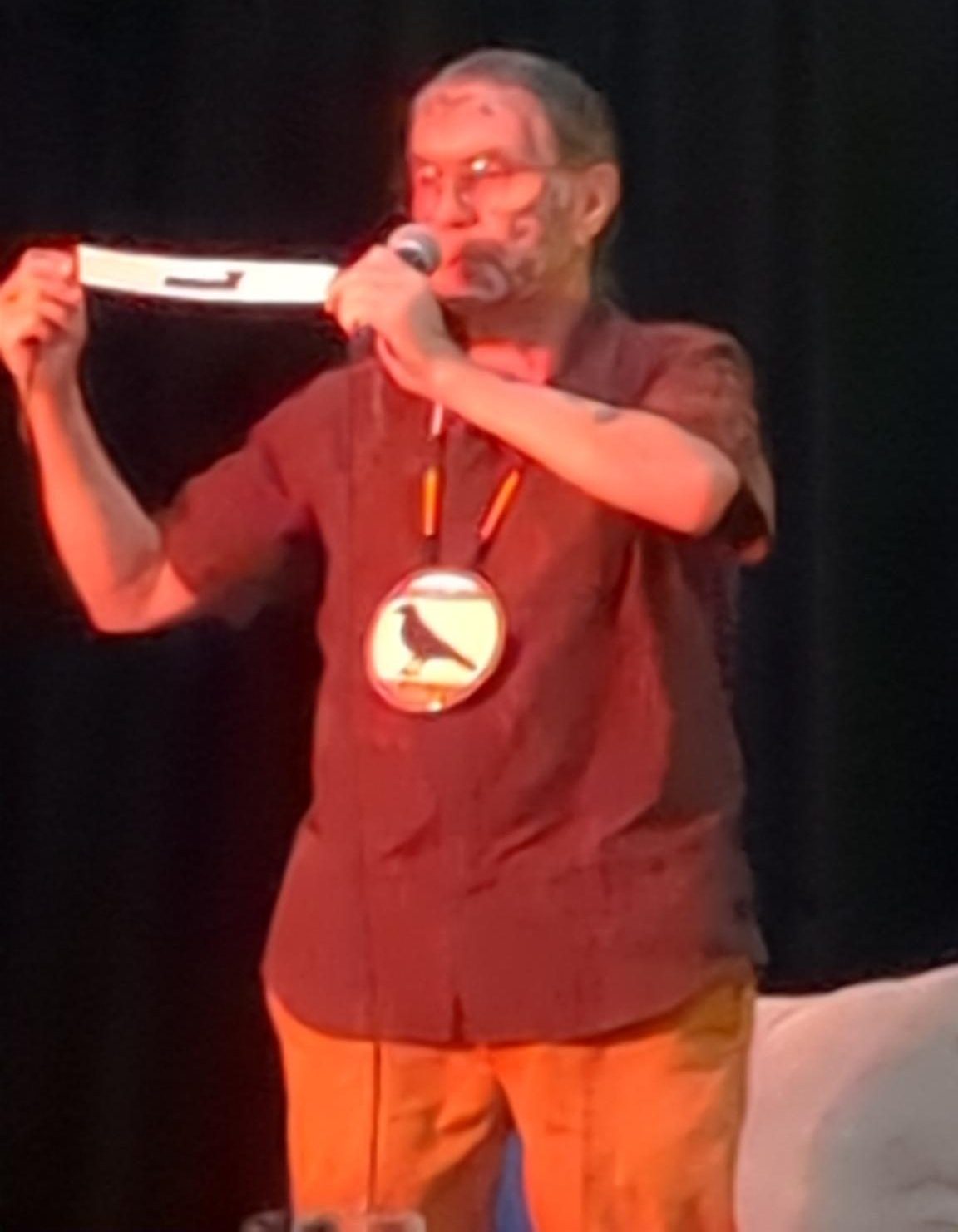
Describing his experiences at the United Nations, Grand Chief Tremblay said he “got spiritually and physically sick” watching Canada lie at the global forum. He said that power is skewed in favour of corporations and the World Bank, while Black and Indigenous People and People of Colour (BIPOC) people are tokenized. The Grand Chief has been to the United Nations Permanent Forum on Indigenous Issues five times.
Mohamed Adam Tebin Suliman, who is part of the Sudanese community in the city, spoke about colonial economics and the fractures they produced. He described how colonization marginalized Indigenous cultures and institutionalized hierarchies that privileged some ethnic and religious groups over others.
“Sudan’s modern history is one of stolen resources, cultural erasure and repeated wars – from the first phase between 1955 – 1972 through the prolonged war between 1983 – 2005 and to South Sudan’s secession in 2011,” said Suliman. Since 2019, the conflict between the Rapid Support Forces (RSF) and the Sudanese army has resulted in widespread violence.
Suliman mentioned that Canada and the UN have provided food, water, sanitation and health care supports.
“Western Sudan, around Marrah Mountains is not directly part of the war. Six million people live and take shelter but there is a lack of food, cholera and malaria are common,” he said. He also appreciated the International Criminal Court (ICC) for its investigation of the war in Darfur, which involved a campaign of ethnic cleansing against Darfur’s non-Arabs. Recently, on October 6, in the first conviction of the Darfur investigation, Ali Kushayb was found guilty of 27 of the charges brought against him, including gender-based crimes, rape, torture and displacement of a population.
Helmi Alfarra, who was born and raised in Gaza, spoke with both grief and resolute clarity about the systemic nature of violence there.
“My family members are still there along with thousands of Palestinians. I lost over 200 people, my uncle and his nine children, 20 first cousins,” he said.
He described Gaza and the West Bank as policed, contained geographies, “they destroyed everything and want to make Gaza a reserve,” noting that the territory has been effectively blockaded for decades. “The West bank is like small islands, separated with apartheid walls,” he added.
As in Sudan, Alfarra emphasized the “divide and conquer” tactic. “In Gaza, there are militias who are Palestinians but are supplied by Israel. In 1982, they funded the militias in Lebanon, who carried out the Sabra and Shatila massacre,” he said. Between 1,300 and 3,500 civilians, mostly Palestinians and Lebanese Shias, were killed in the Sabra and Shatila massacre in Beirut.
Alfarra argued that international law and the UN have been constructed to protect colonial powers rather than the colonized, citing the refusal of the US to enforce arrest warrants against Benjamin Netanyahu and Yoav Gallant. “Canada’s hands are not clean either,” Alfarra said. “They are arming the genocide while denying it. They also offer diplomatic support to Israel and criminalize resistance,” he said.
The conversation turned to resistance movements next. “I woke up in the middle of the night shaking and sweating,” said Grand Chief Tremblay, recalling the trauma of having a gun pointed to his head while supporting the Mohawk people during the Oka blockades in 1990.
When talking about the protests against fracking in the early 2010s, he recalled, “We went to Elsipogtog and camped out for the summer. They had the RCMP squat team arresting us, I got kicked in the back and they tried to grab the sacred pipe. My friends were roughed up.”
The proposed Sisson tungsten and molybdenum mine near Stanley concerns the Grand Chief and others in the Nashwaak watershed. “The talks with Susan Holt went south. Instead of cutting ties with the US, the project has funding from the US Department of Defense. We told her she is promoting genocide by accepting this money,” said the Grand Chief.
Suliman, who hails from Western Sudan, spoke about the Sudan Liberation Movement (SLM), which was founded by members of three Indigenous ethnic groups in Darfur. Prominent among the founders were Abdul Wahid al-Nur of the Fur, Khamis Abakar of the Masalit and Minni Minnawi of the Zaghawa.
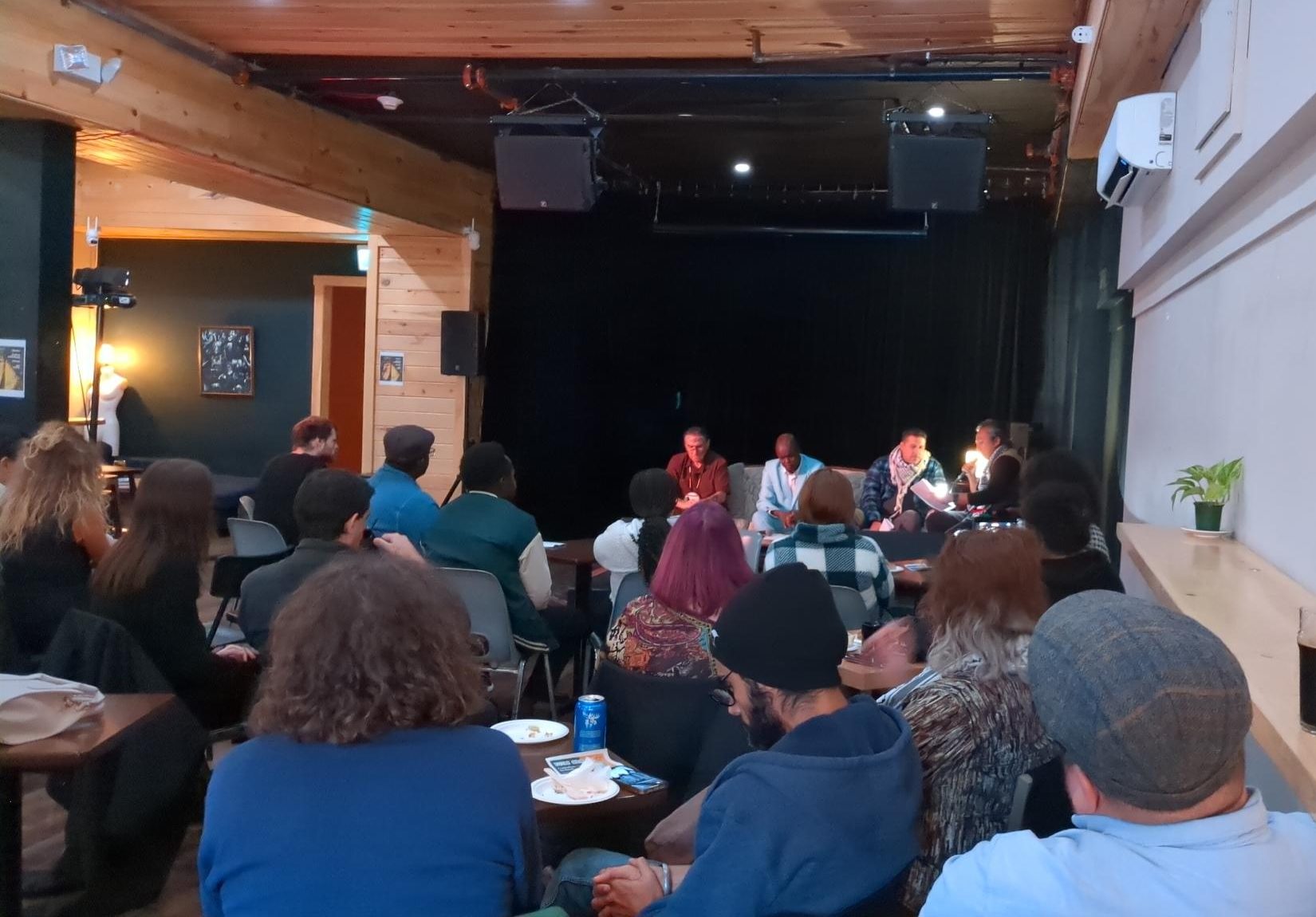
“The SLM played a big role in toppling autocratic rule briefly in 2019 but the revolution continues, the SLM has a vision. People shouldn’t have fear, there must be freedom,” Suliman said.
The SLM has several splinter groups operating in other areas that have drawn students, civil councils and other ethnic groups in. Suliman said that the SLM continues to negotiate with the RSF, the Sudanese army and other countries for an end to violence and for humanitarian assistance.
Alfarra reminded the room that resisting occupation takes many forms, including armed struggle, underground education, medical care, and cultural survival. He cited Palestinian doctors’ work during bombardments.
Alfarra critiqued the conflation of resistance with terrorism in media and public discourse. “We hear constantly about Hamas. Anyone they don’t like turns into a terrorist. Palestinians fighting an occupation become terrorists,” Alfarra said.
“Mandela was a terrorist, Samidoun is a terrorist organization and someday this meeting might be terrorism. This is the colonial system,” he added.
Samidoun is a Palestinian prisoner solidarity network and advocacy group based in Canada, and was designated as a terrorist organization in October 2024. Alfarra pointed out that there are many other groups such as the PFLP, Fatah, and Islamic Jihad that are fighting.
“Ninety per cent of founders of these groups are the children or grandchildren of people expelled in 1948 or 1967. People will not live on their knees and die in silence,” he added.
The panel’s final theme was liberation. Grand Chief Tremblay’s vision of liberation returned to the Wabanaki creation stories and governance, a reconstituted Longhouse of consensus, listening to clan mothers, and reasserting the Indigenous system. He displayed the wampum belt, that symbolizes balance and agreement, along with the war and peace belts. “In the longhouse everyone has a voice, it is also a place where you go to listen,” he said, calling the process both political and spiritual.
To Suliman, liberation meant “unshackling the human spirit.” He emphasized the need for transformation that restores dignity, nurtures diversity, centers self-determination beyond narrow transfers of power. “Nations cannot be built with weapons or revenge. We need to break cycles of war and repression between Arab and African people. Dreams come from the will of regular people,” he added.
Suliman urged pragmatic support for areas like Al-Fashir and Marra, where local movements envision inclusive governance, and he pushed for international pressure that centers civilian-led justice rather than foreign-backed military deals.
Alfarra insisted that liberation will require sacrifices and solidarity. He quoted Malcolm X who said those unwilling to die for liberation should remove the word from their vocabulary – urging the audience to use their privilege as a weapon not as a shield.
“The Palestinians who were killed lost everything, and they were ready to die,” he said.
Alfarra also warned of creeping legal restrictions at home in the form of Bill C-9 that will criminalize protest. “The system wants to see how far we will go. They think we will live their lives and look away. If losing our job or degree or status is enough to scare us then we’re not free,” Alfarra concluded.
Nomaan X is an organizer with the Saint John Community Coalition and teaches at the University of New Brunswick in Saint John.

